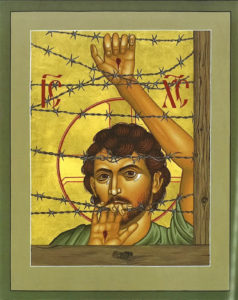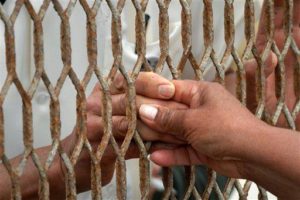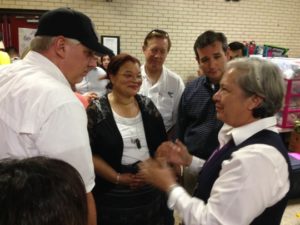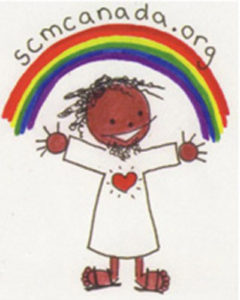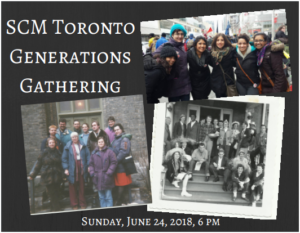Last week, Biblical scholar Trent Voth wrote a short post on Facebook addressing the use of the Bible by secular authorities in the US. He was willing to offer it as a blog post for the SCM!
A Word on Romans 13…
You’ve read enough on Romans 13 ever since U.S. Attorney General, Jeff Sessions, and White House Press Secretary, Sarah Huckabee Sanders, used it to justify the Trump administration’s policy of separating immigrant children from parents*. It’s governments’ favourite verse. Who wouldn’t want a verse instructing an entire religion to “obey” them, especially a government? The thing is, Romans 13 doesn’t say “obey the government.” Not at all. Obeying the government, after all, is antithetical to Christianity.
Jesus was executed by the government for disobedience and dissidence. Jesus forms a competing system of governance, his own Kingdom, with its own systems of justice and peace.
Paul, the author of Romans 13, was imprisoned and, according to the early church, executed by the government for disobedience as well. Paul was preaching a message which undermined the government and elevated Jesus’ competing Kingdom.
Those earliest Christian voices also thought it was important to pass on to us the message that at least ten of Jesus’ Twelve Apostles were executed, and another exiled, by the government for disobedience, all for preaching and propagating Jesus’ competing Kingdom.
In fact, the only Apostle who isn’t punished by the government for disobedience is Judas. Tellingly, he’s also the only one who collaborates with the governing authorities.
On top of that, dozens, if not hundreds, of the very Roman Christians Paul writes to in Romans 13 are experiencing persecution, imprisonment, and execution by the government for disobedience. Likewise, thousands of Christians have faithfully experienced persecution and execution at the hands of the governing authorities.
The Bible anticipates those confrontations between Christians and the governing authorities in texts like Mark 13:9-13 and celebrates the martyrdom of Stephen, by the Jewish governing authorities in Acts 7. The Bible celebrates and elevates Jesus using competing terminology hijacked from the Roman government, like kingdom, king, Lord, and savior. The Bible even explicitly states, in the voices of Peter and the apostles, “We must obey God rather than any human authority.”
In short, Christianity and its scriptures are clearly and preponderantly weighted against obeying the governing authorities. Christians would be in a terrible bind if Romans 13 actually said “obey the government.”
Here’s my point:
It’s really, REALLY important that Paul wrote “submit to the government” in Romans 13, and not “obey.”

The Greek words behind these terms are key. “Obey” means “to do what you’re told.” Submit means “to allow yourself to be arranged.” In other words, obedience is about doing what is commanded, submission is about where one is placed. Governments can dictate where we obey God, not whether we obey God. Governments can dictate we obey God public spaces, in prison, or, sometimes, at Golgotha, but no government dictates our obedience. That’s what “submit” means, and thankfully, the Bible is FULL of examples of submitting to the governing authorities.
Many of the earliest Christians – particularly Jesus and Paul – submitted to the government… in the midst of their disobedience. Jesus takes up the cross and instructs any who want to be his followers to do the same. Paul sees his imprisonment and beatings as a sign of faithfulness. Disobeying the government was required because there was a conflict between the government presiding over the land in which they lived and their kingdom, in which they were citizens. AND, they submitted because submission is at the heart of how their kingdom wins its victories.
Look no further than the Gospel of Mark and the idea of being “handed over.” Being “handed over” to the governing authorities is exactly what happens to John the Baptist in Mark 1:14; it’s what Jesus predicts will happen to him in 9:31 and 10:33; it’s what Jesus predicts will happen to his followers in 13:11… it’s also what Judas does to Jesus in 14:42; what the Sanhedrin does to Jesus in 15:1; and what Pilate does to Jesus in 15:15. And Jesus goes along with all of it. Submitting to being “handed over” is part and parcel what it means to follow Jesus. That’s the heart of Jesus’ core invitation to would-be followers in Mark 8:34 where he instructs anyone who would be his followers must deny themselves, take up the cross, and follow. That’s obedience to Jesus by means of submitting to the governing authorities. That’s what “take up the cross” means.
But here’s the most important part, every time someone submits to being “handed over” to the governing authorities in Mark’s gospel, the kingdom of God expands… and wins.
So, what’s Romans 13 really about then?
Romans 13 is mostly about reminding the Roman Christians what to live and die for. The Christians in Rome were facing some difficult decisions. Navigating and negotiating the Roman government is clearly one of them. Nero will go down in history as the emperor who persecutes the Christians and presides over the deaths of Paul and Peter. That’s the “governing authority” Paul has in mind when he writes Romans 13. Paul’s point is clear.
Don’t be a tax-dodger! One cannot give a Christian witness while dodging taxes. Paul is instructed the Christians in Rome to avoid giving Nero’s government (and their own neighbors) such an easy excuse to discredit Christ. No Christian ought to find themselves imprisoned or executed for tax evasion. “Taking up the cross” is about following a different King, not pocketing what one owes. That’s the primary argument behind Romans 13, paying what one owes, and that’s where our much-needed exception-clause is found.
If you keep reading in Romans 13 (many people incorrectly stop at verse 8) Paul outlines that we are to pay what we owe… whether it’s taxes, honor, or respect… but then Paul concludes by noting that we owe LOVE all the time… to everyone… we’re never done paying love.
THAT’S the key.
We owe love, even when we’ve paid off our taxes. When the government calls us to do something unloving we remember that King Jesus, who has our obedience, commands us to love. So THAT’S when Christians disobey the government, and if they choose to arraign us, we submit (because THAT’S how Jesus wins).
… and THAT’S Romans 13.
Trent Voth is a Mennonite Biblical Scholar and Ph.D candidate at the Toronto School of Theology. He’s particularly passionate about The New Testament, specifically the Gospel of Mark and Anabaptist Theology.
*For some additional reading on this, we recommend this tweet thread exploring Romans 13 and US history:
https://twitter.com/talbertswan/status/1007663937578553345
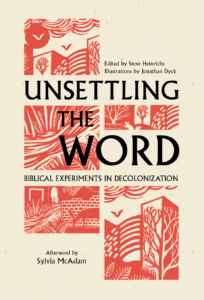 The Student Christian Movement of Canada, in partnership with Mennonite Church Canada, has released a new Study Guide to aid groups in ‘Biblical Experiments in Decolonization’. Can you form a small group to explore this new book?
The Student Christian Movement of Canada, in partnership with Mennonite Church Canada, has released a new Study Guide to aid groups in ‘Biblical Experiments in Decolonization’. Can you form a small group to explore this new book?
